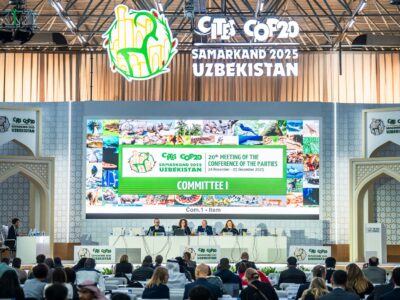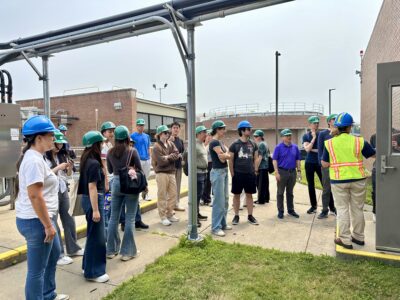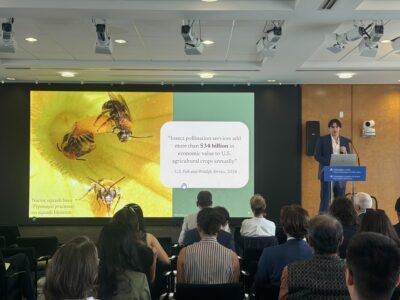
After she graduated from New York University in 2009 with a Bachelor’s degree in Sociology, MPA in Environmental Science and Policy student, Andi Broffman, worked for Community Solutions on their 100,000 Homes Campaign. The initiative aims to house 100,000 of the most vulnerable and long-term homeless Americans by July of 2013 by mobilizing communities nationwide to find and adopt concrete housing solutions. This semester, Andi decided combine her passion for social justice with her study of environmental sustainability by taking an internship with the Institute for Conscious Global Change, a non-governmental organization that uses global information systems (GIS) to create a visual solution to the UN’s Millennium Development Goals (MDG). By using global information systems to create a virtual globe of the “Millennium Earth,” the organization can track agricultural, medical, educational, economic, environmental, and developmental problems throughout the world. Andi aims to gain a more thorough understanding of global information systems through her internship so that she can track the progress of the MDG, in addition to seeing where more progress can be made.
1. What organization will you intern with this semester and what will you be doing?
This semester I am interning with the Institute for Conscious Global Change, a non-governmental organization (NGO) with a mission to re-shape the way individuals both interact with and structure their environment. I am working specifically on a task called the Millennium Earth Project. This endeavor employs global information systems (GIS) to visually display the progress of the United Nations’ Millennium Development Goals while highlighting unaddressed needs and further opportunities for the advancement of these goals in the world’s least developed countries. I have been asked to collect data on Goal #7, environmental sustainability, specifically in Haiti and the Democratic Republic of the Congo. The type of information I am seeking includes active NGOs and their projects that promote environmental sustainability, as well as national, regional and local government and community action in this area. With this data, the Institute for Conscious Global Change aims to streamline processes and align priorities to allow for the efficient use of existing resources to achieve environmental sustainability.
2. What drew you to work at the Institute for Conscious Global Change?
The Institute for Conscious Global Change places an emphasis on transforming the lives of those considered the bottom two billion, which is what initially attracted me to this organization. This commitment provides a mechanism for me to further explore the connection between social justice and environmental sustainability. Additionally, I feel very strongly about a central tenet of the Institute for Conscious Global Change’s mission: understanding the unique vision that each country and the governments and communities within these countries have for their own development. I believe this approach to helping a country realize its goals is key for fostering the progress and collaboration that the Institute for Conscious Global Change is aiming to catalyze.
3. What skills and tools do you hope to acquire through the internship?
I am most keen on gaining a better understanding of GIS. This includes data formatting in the research phase as well as the input of information into the software in a way that renders it useful for end users. There is also an element of international collaboration and effective communication necessary to achieve the organization’s mission, both of which are skills that I am always happy to further improve upon.
4. What do you like most about your internship?
Besides learning about projects that are actually being implemented to achieve environmental sustainability, I am thrilled to be working with a diverse team of international individuals. The collective resources of the group are impressive, and I am excited to have the opportunity to learn from these people.
5. How do you intend to combine your internship experience and your degree from the MPA-ESP program to further your career?
I applied to the MPA-ESP program to be able to continue working in the non-profit sector on policy issues, but I wanted to re-focus my work towards the environment. In classes like Adaptation to Climate Change and Climate Change in Africa, the link between social justice issues and climate change became very apparent to me, and I now feel equipped to use both my past work experience, the knowledge I have gained at Columbia and the skills I will acquire through my internship to work professionally on these issues.
Upon leaving school, I intend to combine the critical thinking and communication skills I have obtained from the MPA-ESP program with my understanding of the complexity of environmental sustainability and sustainable development for a career in the field of climate change adaptation. I hope to work with local communities in developing countries to develop adaptive capacity and implement adaptation measures that are appropriate and meaningful to those impacted.
Students in the MPA in Environmental Science and Policy program enroll in a year-long, 54-credit program offered at Columbia University’s School of International and Public Affairs, in partnership with the Earth Institute. Throughout this one year program, students are immersed in courses that combine Columbia University’s hands-on approach to teaching public policy and administration with pioneering thinking about the environment. During the summer semester, students learn the fundamentals of environmental science, while the fall and spring semesters focus on teaching the policy and economics necessary to becoming successful environmental analysts and managers. The 62 students come from a wide variety of backgrounds ranging from Sociology to Engineering and come to us from 17 different countries. Please visit our website to learn more about the program.




[…] in the semester, we spoke with Andi Broffman, a student in the MPA in Environmental Science and Policy (MPA-ESP) program, about her internship […]